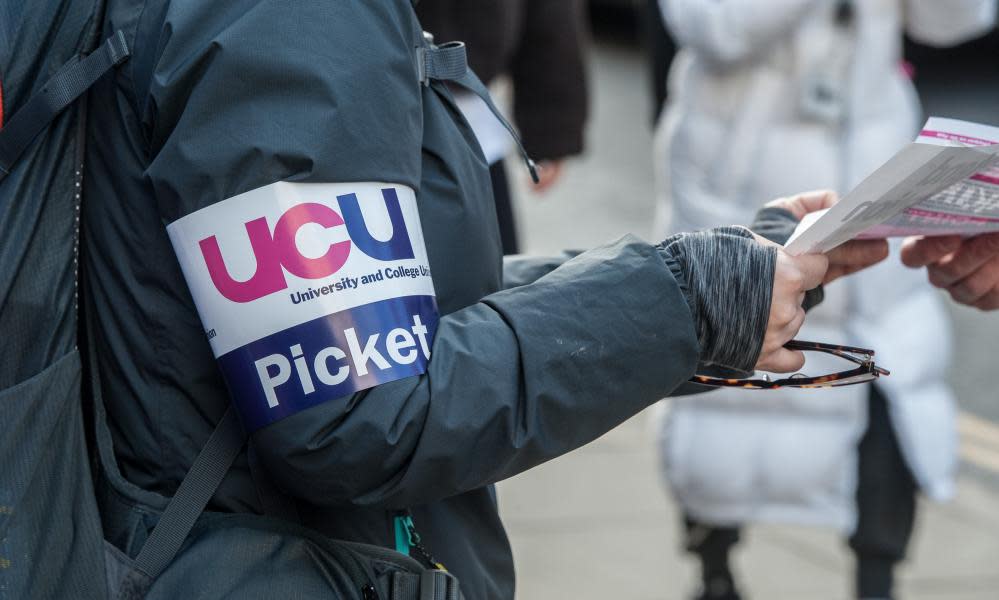A decade of marketisation has left lecturers with no choice but to strike

Along with tens of thousands of university workers at 58 institutions across the UK, I have been on strike for three days this week over pensions, pay and conditions. For workers at Goldsmiths this national strike has fallen in the middle of an epic, local three-week strike of our own – over management proposals to sack 52 staff, as part of a cost-cutting plan financed by big banks.
The national action and our local strike are connected: the factors that led to a vote for strike action by more than 70% of University and College Union (UCU) members nationally are the same ones that have produced a dramatic confrontation at Goldsmiths. Indeed, the situation at Goldsmiths, a small University of London college specialising in arts, humanities and social sciences, could be a window on to the future of higher education nationally: a future of casualisation, swingeing cuts and the possibility of troubling interventions from financial institutions.
The national dispute encompasses a wide range of elements, the most high-profile of which is pensions: like public sector workers before them, university staff face an attack on our defined-benefit retirement schemes. The employer, Universities UK, is attempting to cut our pensions by more than 30%, using a reportedly flawed valuation taken at a low point in the economic and social crisis caused by the pandemic. The dispute amounts to a cluster of grievances over working conditions known as the “four fights”: pay, equalities, workload and casualisation. Higher education is one of the most heavily casualised sectors in the UK, with two-thirds of researchers and half of teaching staff employed on fixed-term (ie temporary) contracts.
For many younger academics it is casualisation that has spurred us to take action in the national dispute. I spent seven years on seven different casual contracts across three institutions before I got my first permanent position at Goldsmiths this summer. Many of these contacts are desperately low paid; at times I was taking home just £2,000 a year from teaching, and having to work three jobs to survive. But it is also the insecurity that is crippling: it is impossible to plan your career trajectory and life in general without knowing if you’ll be in work next year. Casualised staff are also the first to be laid off in a crisis: Goldsmiths attempted to release nearly 500 of us at the start of the pandemic last spring, though we fought back.
Related: On the picket line at Leeds University: ‘I will strike for as long as it takes’
The national dispute is the result of what has been called “a decade of marketisation” in higher education. And it is marketisation – the move to turn education from a public service into a commodity – that laid the conditions for our local dispute at Goldsmiths. The overhaul of higher education funding in 2010 by the coalition government, particularly the removal of most direct government funding for courses, meant universities became heavily reliant on the volatile and unpredictable stream of income from student tuition fees. Humanities departments outside of the elite universities have been under pressure ever since, with several (such as politics and history at Kingston) being shut down altogether. Universities have sought to cut staff costs through redundancies and increased use of casualised contracts.
The 2010 reforms also empowered a new generation of university senior managers who see their role as combining “streamlining” and cost-cutting measures with management speak about social justice and inclusion. Goldsmiths’ senior management is archetypal in this respect, with the warden, Frances Corner, dressing up a 2019 plan to axe staff as part of a mission to “secur[e] our legacy as a beacon of progressive, critical thought and in the vanguard of social justice”.
Goldsmiths’ latest move in this direction involves a plan to cut 52 jobs across professional services, English and creative writing, and history courses, centralising administration and likely cutting courses in the process. An alarming aspect of the plan is the mooted role of the banks: Lloyds and NatWest are thought to have insisted on reductions in staff costs as a condition of loans given to the university. If this is the case, it raises the worrying prospect of private banks dictating terms to a public university: an eerie echo of Gary Shteyngart’s 2010 novel Super Sad True Love Story, which imagined a character “studying art & finance at HSBC-Goldsmiths”.
The possibility of an alliance of cost-cutting senior management and finance capital has provoked a heartening response from a militant union branch and a politicised student body: 86% of Goldsmiths’ UCU members, on a 70% turnout, voted to strike. The three-week period of industrial action has featured a varied programme of teach-outs run jointly by students and staff, a march on local branches of Lloyds and NatWest, and a huge solidarity rally addressed by former shadow chancellor John McDonnell.
Unless marketisation can be resisted at a national level, the situation at Goldsmiths – in which funding volatility linked to the 2010 reforms has allowed banks to exert influence – will become much more common. These are two struggles we have to win.
Jacob Mukherjee is a lecturer in media, communications and cultural studies, and co-secretary of Goldsmiths UCU

 Yahoo News
Yahoo News 
